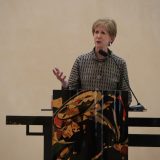
Faculty Books: Contours of Israeli Politics – Jewish Ethnicity, Religious Nationalism, and Democracy
September 5, 2024

Dr. Hannah Ridge
Assistant Professor Hannah Ridge’s (Political Science) latest book Contours of Israeli Politics: Jewish Ethnicity, Religious Nationalism, and Democracy looks at the socio-political effects of ethnic prejudices within the Jewish community in Israel.
The Voice of Wilkinson sat down with Dr. Ridge to discuss her book and what she hopes readers will learn from her work.
Voice of Wilkinson: Tell me a little about your latest book Contours of Israeli Politics: Jewish Ethnicity, Religious Nationalism, and Democracy.
Hannah Ridge: I started working on it after comparing new research on the role of colorism and in-group biases in American race and ethnicity politics with what I knew about Israeli politics. Within the privileged macro-group, there is a preference for European-origin Jews (Ashkenazim) over Asia- and Africa-origin Jews (Mizrahim and Sephardim) – we call it “Ashkenormativity.” It sort of parallels the position of darker-skinned versus lighter-skinned or upper- versus lower-class white people in America.
VoW: Why this topic?
HR: I wrote this book because I think we can learn a lot by putting cultures in conversation with each other and seeing what patterns form in one place and whether the same things happen in other places or why they differ.
VoW: What did you learn why researching for this book and what do you hope readers will gain?
HR: I wanted to put this material in the historical context, so I delved into the waves of migration to Ottoman Palestine, Mandatory Palestine, and Israel to show the demographic developments. I also learned about the process of migrant acculturation – pushing the Asian and African Jews to change their culture and customs. Some Mizrahi immigrants described the process as traumatic. I was so used to Ashkenormativity as a phenomenon that I hadn’t realized how recently it developed or how much the Israeli government had been part of its formation. There is great work by scholars like Neta Oren and Aziza Khazzoom on this topic.
I hope ethnic politics researchers appreciate the comparative element and the fact that distinctions within social groups can be as politically important as differences across groups. I would like Israeli society audiences to understand the impact that Ashkenormativity continues to have on Israeli politics and the lived experiences of Mizrahi Israelis. Some people try to claim this bias is a thing of the past, but we can still see it in how people are treated and how they are reacting politically.
VoW: The last time we met to discuss your book, Defining Democracy: Democratic Commitment in the Arab World, you mentioned this book was in publication and that you were “happy to be pushing the borders a bit” … what did you mean by that?
HR: Most work on race and ethnic politics is still very focused on the US. It is great work, but we need to be careful about assuming the US is a representative case. Not every country has the US’s history or acts like the US. We can learn from it, but we should also examine other contexts too. That’s where what we could call comparative race and ethnic studies comes into it. I’m pleased to be part of push to internationalize this research area.
Dr. Ridge is currently building on her research on Israel for her next project.
“We’ve all heard about Christian Nationalism in American politics, and we see Hindu Nationalism operating in India. My next project focuses on the influence of Jewish Nationalism in Israeli politics. It raises a lot of the same concerns for freedom and democracy that Christian Nationalism raises.”
(Photo at top: Photo by Cole Keister on Unsplash)

